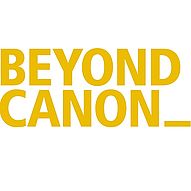
Latest News
Latest News and Events at CAS "Beyond Canon_"
11.03.2024:
The grand radiance of “Beyond Canon_”:
A place to find allies in scholarship to rely on forever, according to many guest scholars of the CAS
The Centre for Advanced Studies (CAS) “Beyond Canon_” at the Universität Regensburg (UR) has been attracting more and more scholars from all over the world who want to be here, even without receiving the Centre’s DFG-funded stipend grants. As tenants of Temporary Positions of the DFG, as fellows of the Alexander von Humboldt-Foundation, the Fritz Thyssen Foundation, Margarita Salas, or Swiss National Science Foundation (SNSF) and through other funding bodies, they bring third-party funded projects from different sources. The most important, unique aspect all people come to the Centre for is the global interdisciplinary network of highly accomplished scholars of many disciplines – and the friendships one can make here.
Proof of the success of the CAS “Beyond Canon_” are its agglomeration effects and radiant power, personified by many scholars on different career levels from various origins all over the world who chose to work associated with the chairs of the three directors of the CAS. Since the establishment of “Beyond Canon_”, the chairs of Prof. Tobias Nicklas, Prof. Harald Buchinger and Prof. Andreas Merkt hosted almost 30 projects (10 Temporary Positions funded by the DFG, 12 by the Humboldt-Foundation, and one Temporary Position funded by each, the Fritz Thyssen, the Gerda Henkel, the Margarita Salas Foundation, DAAD, and SNSF).
“Beyond Canon_”’s agglomeration effects bear fruits – and make dreams come true
Four emerging scholars of this ever-growing group of visiting researchers from different countries who brought their research projects to Universität Regensburg because of the well-known, high-quality research context at the Centre were happy to share their experiences. They either were or are still working as postdocs here and are sharing with us their motivations and experiences.
Dr. K. Luc Bulundwe from Switzerland, a postdoctoral researcher whose project is funded by the SNSF, first heard about the University of Regensburg through Gabriele Palasciano, a scholar friend who published two edited volumes and one book on Pope Benedict XVI., specifically the “discours de Ratisbonne” (the famous “Regensburg lecture” from 2006). “And quite quickly I also heard about Prof. Tobias Nicklas as a very important New Testament exegete. I actually got to meet him in 2017 in Berlin at a conference on the Receptions of Paul. But about the existence of the Centre and my goal to come, it was during my dissertation that I came to know of this institution.” While working on his dissertation, Prof. Jörg Frey (Universität Zürich with excellent connections to Regensburg) asked him about his plans for the time after his PhD. Since Luc intended to start a research project on the book of Revelation and looked for a place fit for that, it was natural that Prof. Nicklas’s name as an expert in this field popped up again. “I visited Regensburg and the Centre for the first time in 2021 and just a little later had the opportunity to present my project outlines at a joint meeting with the Centre and New Testament colleagues from Leuven and Berlin,” Luc says. Then the decision was clear to take his SNSF-funded postdoctoral research project to Regensburg: “In the meantime, I not only had met Tobias Nicklas again, but through him I also got acquainted with Prof. Michael Sommer, Tobias’s former doctoral student, now professor in Frankfurt, who is yet another expert in this field I am also working in.”
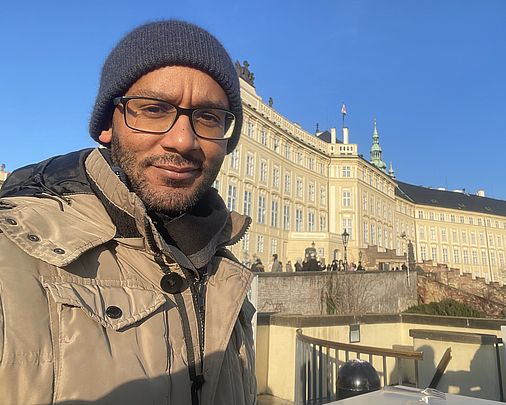
For Dr. Elisa Manzo, the connections to Regensburg regarding her research topic were not as clearly visible from the beginning: Elisa, born and raised in southern Italy, studied in Naples and did her PhD on Orosius, a late-antique theologian and historian, in a joint programme between Italy and Spain. Originally having been trained in medieval history, Elisa has a slightly different background, not only regarding her current research topic, but also regarding many scholars at the Centre. Still, she feels like having a strong and longer connection with the UR. She first read about the university during her Master’s studies around 2015, already within the context of Orosian studies: Adolf Lippold, 1968–1994 professor of Ancient History at UR, is considered to have been one of the leading Orosian scholars. Elisa’s doctoral supervisor from Naples, Prof. Luca Arcari – a former fellow of “Beyond Canon_” himself – got in touch with Tobias Nicklas. It was through this connection Elisa then had the opportunity to come to Regensburg for one year as a “Margarita Salas” Postdoctoral Fellow from the Department of Historical Sciences at the University of Cantabria in Santander, Spain, (the fellowship is financially supported by the Spanish Ministry of Universities and the EU “Next Generation funds”), taking with her the project on the Reception of Apocalyptic Literature in Orosius’s works. Apocalyptic literature and its reception are also research topics the CAS focuses on. For Elisa, the CAS was the ideal place to work, to get in touch with experts in the field to receive feedback, advice, and comments from biblical and theological scholars – but also from a personal point of view. She describes her experience as “full circle”, since working on Orosius at the UR felt to her like bringing Orosius back home. Thus, she states the UR as a whole has a very important meaning to her as a scholar. The often-emphasized agglomeration effects and the fruitful networking of the Centre worked quite well for Elisa on another level, too: the directors of “Beyond Canon_” suggested Elisa to the organizers of the interdisciplinary lecture series “Antike Weltuntergänge,” where she had the opportunity to open the series in October 2023 with a fantastic talk. This chance to speak not only about the lesser-known Orosius, but first and foremost to present her own research in different contexts, made her time in Regensburg a very positive experience, Elisa states. The fact that she could increase her visibility as a scholar and make herself more noticed is yet another thing Elisa considered very valuable about her stay at CAS: people now know about her and her project, she could make connections and broaden her own network, and even create the foundations for future projects and collaborations, like organizing a panel at the prestigious International Conference on Patristic Studies that takes place every four years at Oxford University in the UK. “In Regensburg, I found motivation and support to take on as big a proposal as the one for Oxford – and I also found the right people here at the Centre to work with on this dream of mine and make it come true! The Centre actually was the core of the proposal. So, in the end, my stay here was overall beneficial.”
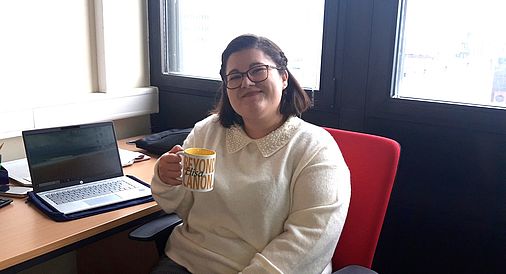
The Centre’s networks lead to further opportunities
Not only the local network of theologians, biblical scholars, and many more who were present in Regensburg made the stay worthwhile for Elisa. There opened up many other possibilities to broaden the circles: Elisa and Dr. Jacob A. Lollar, a postdoctoral researcher from the US with a research project financed by the Alexander von Humboldt-Foundation, were among a small group of people from the Centre who went to Glasgow to join a workshop organized by scholars from the University of Glasgow, the University of Oslo, and “Beyond Canon_” – a network that has proven to have the potential to grow into a longer-standing connection with many plans for future joint ventures.
Jacob learned about Regensburg and the CAS also through another former fellow of “Beyond Canon_”, Prof. Janet E. Spittler, who has a long history with the UR, having visited Regensburg multiple times: before the Centre existed, she also came as a Humboldt fellow to the UR and had nothing but praise to say, as Jacob remembers. While a postdoc in Texas, Jacob met Janet at a huge international conference around 2019 while she was a fellow at UR and allegedly told him: “I am going to plan out the next few years of your life” – and that planning proved to be successful. Prof. Nicklas also attended this conference, talking about Apocrypha and the CAS – “and the rest was kind of history,” Jacob states. Contacts developed into deeper support with project applications, and in 2021 Jacob was officially granted the funding for his next project by the Humboldt foundation. After spending some time in Paris during his PhD years, for Jacob and his family the idea of moving abroad again was very attractive, and so they made the transition to Regensburg in 2022. “It’s been a great journey,” Jacob says. “One of the things that is the highlight for me being at the Centre and at UR is the connections that I’ve been able to make: I never could have anticipated how many amazing people I would meet here. That was not my experience at all when I was in France. Everyone is so welcoming here. And the connections I’ve made especially with the people I’ve met from Oslo and Glasgow have helped me with applying for further research grants: it was actually through the help and encouragement of people like Garrick Allen and Hugo Lundhaug who helped me with my successful application for the British Academy, and hopefully – if I will go into this direction – of an ERC grant. These, among many others, have just been phenomenal connections, both on a personal and professional level.” This makes it clear: the network of “Beyond Canon_” is not limited to Regensburg.
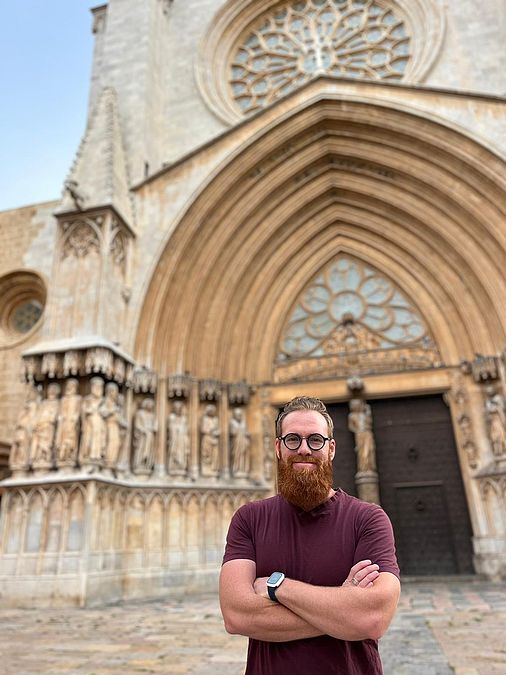
The Centre radiates outside, but also inside of UR: CAS, the Faculty of Catholic Theology, and Medieval Art History
But also within the UR, the CAS has connecting forces, for example with the chair of Liturgical Studies of Prof. Harald Buchinger, one of the Centre’s directors. Dr. Martin Lešák, who is a postdoctoral fellow of the Humboldt-Foundation at the Faculty of Catholic Theology, shares his insights with us. Martin, originally from Czech Republic, adds Art History in the mix, having authored a dissertation on the interconnections between mosaic decorations of early medieval Roman churches and the stational liturgy of the city. Through his work on this topic, Martin connected with Prof. Buchinger who encouraged him to apply for the Humboldt Research Fellowship and supported him in the process. “After completing my PhD, I saw this as a remarkable opportunity to delve deeper into liturgical sources and history, and thus far, being here at the department of Liturgical Studies has really proven to be an enriching experience. This is also thanks to the “Beyond Canon_” Centre and its interdisciplinary nature. Since I have been at the UR, I listened to excellent art historical papers presented within the framework of the Fellows’ Brunch sessions organized at the CAS. For example, a talk on San Giovanni a Porta Latina in Rome by Prof. Sible de Blaauw, who has been a fellow at the CAS multiple times, and of course, Prof. Rina Talgam’s fascinating paper on the floor mosaics in the ancient synagogue of Huqoq (Lower Galilee) stuck in my mind,” Martin states, and continues: “so I am truly glad that these Fellows’ Brunches are taking place. On one hand, they broaden my perspective by exposing me to subjects that are slightly outside my focus are. On the other hand, they provide me with papers that are pertinent to my own research, offering fresh perspectives and innovative approaches.” Martin also underlined the well-connectedness of the Faculty of Catholic Theology and the CAS: the content and the events created at the Centre are well promoted at the faculty, and people are invited to join interdepartmentally, an intertwining he appreciates very much. As a young scholar, he finds immense value in gathering interdisciplinary perspectives and contacts, which he believes inspire him even further, fuelling the creation of intriguing new ideas.
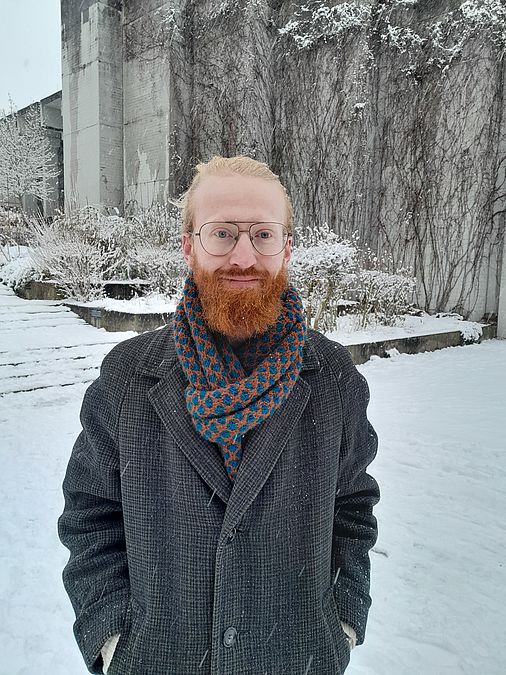
Elisa seconds that, “I studied Medieval history and then, during my PhD, I specialized in history of Ancient Christianity, so I don’t have a background in theology or Biblical Studies. When I decided to start a project on Orosius’s exegesis, I was aware that any field has its own method, issues, and research questions. For this reason, I think that in my case it was important to start my research in the vicinity of a theological faculty, being surrounded by experts in the field who could guide me through research questions, through important topics, the reception of the Book of Revelation or Apocalyptic Literature more in general. For me, starting the project in Regensburg at CAS was extremely important because it was like creating the basis for the building I am supposed to construct with the continuation of my project, and I felt very grateful and also very inspired by all the projects my colleagues are working on and how brilliant they are. This also gave me the stimulus to always do my best, to be curious. I believe starting the project so close to a theological faculty really was the best choice because I learnt a lot for my research. It was extremely helpful.”
Martin Lešák was also able to broaden his network in another direction: Prof. Buchinger brought him in touch with Prof. Albert Dietl, the only remaining professor of art history specializing in medieval art at the UR. Dietl’s research area, which includes the church of Santa Cecilia and its medieval frescoes, aligns with Martin’s interests; he feels they both share a passion for early medieval history and visual culture of Rome, in this context referring to Dietl’s previous tenure as a visiting professor (Richard-Krautheimer-Gastprofessur) at the renowned Bibliotheca Hertziana (Max-Planck-Institut) in 2005/2006. “I am happy to share that Prof. Buchinger, Prof. Dietl, and I are preparing a seminar for the upcoming summer term focusing on art and liturgy in medieval Rome. I am genuinely looking forward to this opportunity and am hopeful that the seminar will be a success.” Martin concludes.
The Danube connects Regensburg with the world
When it comes to living in Regensburg, many were surprised by the outdoor culture practiced here: “people love being outside, going for a walk, hiking, biking, strolling, just enjoy sitting outside, be it in a beer garden or on a park bench,” Jacob noticed. He also appreciates the slower life pace and friendliness of people here. The habit to be outside, enjoying life outside, is also highlighted by Luc. For his family, it was striking to find a good infrastructure regarding playgrounds for the kids, children-friendly places etc. But it is the vicinity to the river Danube that Luc probably enjoys most: living next to this stream, connecting so many European cities with Regensburg, provides an international feeling as well. As Luc says, “being in Regensburg really re-shaped my mindset being from Western Europe, from Geneva, and now being so connected to the Eastern part of Europe with Prague close by, for example – this is really something great I will take with me for the rest of my life, just to be maybe more open. The first time I ever saw the Danube was in Belgrade, by the way! Which is funny because many fellows from Serbia are at CAS. Regensburg feels a little bit like a place in between. And the Centre showed me the great world of the exegetes in Eastern Europe which I very much appreciate and feel it’s crucial to the city of Regensburg and its identity.”
Martin also acknowledges the significance of the river as an element which shapes the pleasant cityscape and encourages people to stroll and relax along its banks. Additionally, he was struck and surprised by the impactful presence of the university’s brutalist architecture. Reflecting further on the city, he remarks that “even by Czech standards, Regensburg’s rich beer culture, boasting several breweries, is something quite special.”
Regarding the famous claim that Regensburg thinks of itself as the northernmost Italian city, Elisa states this is a claim that has never reached southern Italy, where she is from. For her, Regensburg is a special place in itself, with nothing to envy Italy for. The location in Bavaria is what makes it unique for her. “I am more a fan of local identity than borrowing labels from outside or other places,” she explains. “Regensburg has a lot to offer, and that was actually very surprising to me, because as Italians, we know Regensburg mainly for Pope Benedict XVI., as a diocese, as a catholic place. But after one year in Regensburg, I realized that there is really a lot to do, you never get bored. There’s a lot of green space, many social and cultural activities, many of them organized by the university’s amazing Welcome Center, so there’s also a good connection and synergy between the city and the university. Therefore, I felt completely involved in the daily city life of Regensburg. As an Italian I appreciate more the Bavarian or German experience here.”
People and books: the Centre’s network and library are its greatest assets
Jacob remembered he had to make hard choices which books to take to Germany from his home in the US. The majority of them he left behind for the time being, what he brought were many of his necessary and therefore crucial Syriac primary texts. But still, he found himself quite surprised by finding a lot of resources here – both in terms of books and in terms of people, for example Prof. Buchinger’s expertise in Syriac and meeting Dr. Mari Mamyan, an Armenian scholar with complementary expertise – that was something he was not expecting at all. “That was a great surprise and delight,” he states, “the amount of collaboration, help, and collegiality has been incredible: having found allies in scholarship to rely on for, basically forever, has been wonderful.”
Workshop on The Apocryphal Apocalypse of John the Theologian, March 13, 2024
On March 13, 2024, the workshop "Dating an Apocryphal Text: the Apocryphal Apocalypse of John the Theologian as a Case Study" on The Apocryphal Apocalypse of John the Theologian (ApApGvT) will take place. The workshop is organised by Dr. Emanuela Valeriani who is currently Fellow at the CAS "Beyond Canon_".
The workshop will run from 13:00 - 17:00 in University of Regensburg, Sammelgebäude, Floor 3, room 3.14.
Book presentation at “Beyond Canon_” on March 14, 2024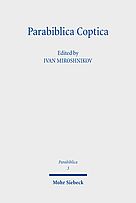
On March 14, 2024, Dr. Ivan Miroshnikov will be our guest at the Centre “Beyond Canon_” in Regensburg. Dr. Miroshnikov will present the book that he edited – Parabiblica Coptica (Mohr Siebeck, 2023).
The book presentation will be followed by two reviewers giving their feedback and thoughts for discussion - Dr. Jacob A. Lollar and Dr. Samuel Peter Cook.
This event will take place on March 14 at 10:00 in University of Regensburg, Sammelgebäude, Floor 3, room 3.14 – at the premises of the CAS “Beyond Canon_”. Everyone is welcome to attend and participate in the discussion!
About Parabiblica Coptica
The volume focuses on the Coptic parabiblical texts – those texts that do not belong to the Bible but fall in its orbit – which include not only the Apocrypha but also the works of the Apostolic Fathers. The contributions deal with a wide range of topics and literary genres, including apocryphal acts and the so-called apostolic memoirs. The volume is divided into two sections: editiones, which contains editions of several important texts in Sahidic Coptic, and studia, which comprises five articles on Coptic parabiblical literature. The literary works discussed in the volume are contextualized in the scope of Coptic literature, regardless of whether they were originally composed in Coptic or translated into Coptic from Greek. Some of the contributions also deal with the reception of Coptic literature in Arabic and Old Nubian literary traditions.
Ivan Miroshnikov. Born 1986; 2008 Specialist Diploma in Religious Studies from Moscow State University; 2016 PhD from the University of Helsinki; Pro Futura Scientia XIV Fellow at the Swedish Collegium for Advanced Study (Uppsala), researcher at Mid Sweden University (Sundsvall), senior research fellow at the Centre for Egyptological Studies (Russian Academy of Sciences), and docent in Early Christian and Coptic Studies at the University of Helsinki.
The 6th EELC Digital Meeting for Emerging Scholars from Eastern Europe will take place on April 5.
The Centre for Advanced Studies “Beyond Canon_” (University of Regensburg) issues a call for papers for the EELC Digital Meeting for Emerging Scholars from Eastern Europe that will take place on April 5, 2024 (10:00 – 17:00 CET).
The Digital Meeting is intended for the younger scholars (experience-wise) in New Testament, Early Jewish and Ancient Christian (and related) Studies from Eastern Europe with an outstanding Master’s Thesis, capable doctoral students and/or post-doctoral researchers, to present aspects of their research to a group of senior scholars and get qualified academic feedback. We also envision that these kinds of meetings contribute to forming collegial and respectful networks among the emerging scholars in the region.
The format: 5 presentations (25 min each), followed by a half hour discussion (after each paper).
If you wish to take part, please, send
1. your short abstract (100 – 200 words),
2. a very short CV
to Alesja.Lavrinovica@ur.de by March 8, 2023.
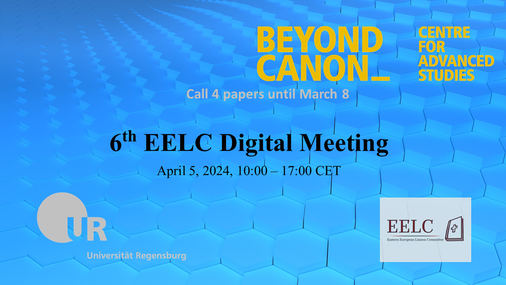
Course: Greek Palaeography II / Dr. Giulia Rossetto (NOT hybrid)
Dates: 30 November 2023–1 December 2023 / 14 December 2023–15 December 2023
Brief description: The goal of this course is to analyze the Greek scripts which were in use between the 13th and the late 16thcentury. It will begin by offering an overview of the main tools (printed and digital) we have at our disposal for the investigation of Greek manuscripts; an overview on the evolution of the Greek writing in the given time span will follow. Students will then learn how to read and transcribe various specimina of hands originating from different geographical locations. We will focus in particular on archaizing scripts, colophons, possession notes and monocondylia.
For the location of the course please ask Gregory Tucker (Gregory.Tucker@ur.de), who is helping to organize the class! As far as the deadline for registration is concerned, it would be great if you’d register with Giulia Rossetto (giulia.rossetto@univie.ac.at) before November 15th, 2023.
Times: 30 November 14:30–17:30 and 1 December 9:00–17:30
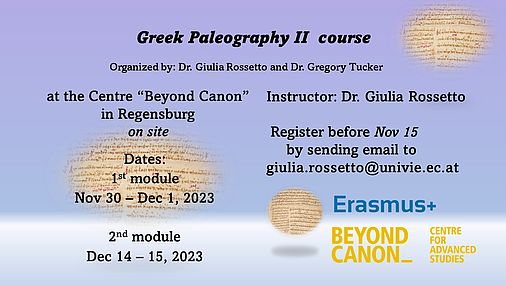
06.12.2023
„The Word of the Lord. Reading the Gospels in Liturgies from Christian East and West”:
The Interdisciplinary Symposium of Liturgical Studies has proven the strong radiance of research in Regensburg
25 researchers from 14 different countries followed the invitation to Regensburg to attend an international interdisciplinary symposium that took place from November 22–25, 2023: “The Word of the Lord. Reading the Gospels in Liturgies from Christian East and West” illustrated the strong radiance of the research context in Regensburg.
A new collaborative project at Universität Regensburg
Dr. Marie-Ève Geiger was the main organiser of the event. Since 2021, she is the principal investigator of her research project on Byzantine gospels and the liturgical year (“ELIKIB: Evangelium und Liturgie in der byzantinischen Kirche: Das liturgische Kirchenjahr in griechischen Tetraevangelien (9.–15. Jahrhundert)“), funded by the Fritz Thyssen Foundation. For the last year of the project, she chose the Chair of Liturgical Studies at UR as host institution. Her topic serves as important contribution to the faculty’s research focus "The Bible and its reception in cultural discourses." Once again, Dr. Geiger and her conference highlight and enhance the agglomeration effects of the Centre for Advanced Studies “Beyond Canon_” as well as of the fact that more and more research projects of individual international scholars are set at the Faculty of Catholic Theology of UR. In this context, Prof. Dr. Harald Buchinger, Chair of Liturgical Studies and Director of the CAS “Beyond Canon_”, emphasised the importance of a certain development: of stand-alone projects which then become collaborative projects – a tendency that has clearly picked up speed at Regensburg’s Faculty of Catholic Theology.
Global liturgical traditions
Dr. Geiger’s conference aimed at exploring the link between the readings of the Gospels during liturgical services and the calendars they are included in. It opened a dialogue space for interdisciplinary exchange with specialists in other traditions from Christian East and West: Arabic, Aramaic, Armenian, Ethiopian, Georgian, Latin, Old Slavonic, Syriac. In the synopsis of texts, rites, and material culture characteristic of the CAS "Beyond Canon_", the event made a contribution both to the faculty's research focus "The Bible and its Reception in Cultural Discourses" and to liturgical studies with a regional scientific configuration. The symposium was co-conceptualised with Prof. Dr. Elena Velkovska, an international doyenne of liturgical studies, who has visited Regensburg multiple times as well as many other participants who partly even held a position for their own research projects at the faculty. Regarding this established network, the organisers concluded with the remarks that this conference resulted in a wonderful assembly of scholars, friends, and future friends.
This conference has contributed to a broader awareness of the importance of liturgical sources both in New Testament studies and in church history.
09.11.2023
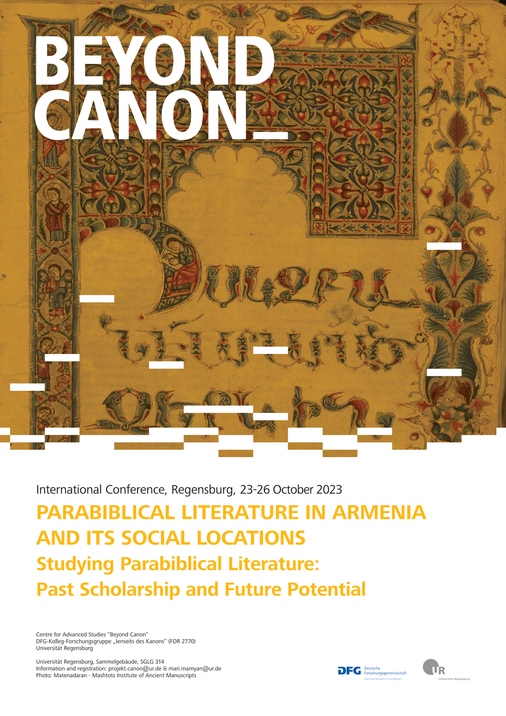
[GERMAN]
„Parabiblical Literature in Armenia and its Social Locations”:
Die internationale Konferenz zu armenischer parabiblischer Literatur vereinte mit Traditionen „Jenseits des Kanons“ und Area Studies zwei Forschungsschwerpunkte der UR
Ende Oktober fand am Centre for Advanced Studies „Beyond Canon_“ (DFG-FOR 2770) die viertägige internationale Konferenz „Parabiblical Literature in Armenia and its Social Locations. Studying Parabiblical Literature: Past Scholarship and Future Potential“ statt. Organisiert wurde die Tagung von Dr. Mari Mamyan (DFG-Eigene Stelle, ehemals Postdoctoral Fellow des CAS „Beyond Canon_“) und Prof. Dr. Tobias Nicklas, Sprecher des CAS „Beyond Canon_“.
Viele junge Forscherinnen beeindruckten neben Koryphäen des Faches
Aus diesem Anlass kamen zahlreiche renommierte Wissenschaftler:innen der Armeniologie nach Regensburg. Viele Forscher:innen aus Eriwan, vor allem junge weibliche, wie z.B. Dr. Lusine Sargsyan und Seda Manukyan, beeindruckten mit exzellenten Forschungsbeiträgen. Daneben sorgte aber auch die Präsenz der gesammelten internationalen Prominenz des weiten Faches für Aufsehen und zeugte vom hohen Renommee des Standortes Regensburg in diesem Bereich, der nur durch den großen Erfolg von „Beyond Canon_“ entstehen konnte. Aus Jerusalem und Kalifornien kamen mit Prof. em. Dr. mult. Michael E. Stone und Prof. em. Dr. Abraham Terian zwei Persönlichkeiten, die das Feld durch ihre Forschung über viele Jahrzehnte hinweg geprägt haben und bis heute prägen. Durch ihre zahlreichen Positionen als Gastwissenschaftler und Professoren an verschiedenen wissenschaftlichen Institutionen weltweit konnten sie ein Netzwerk aufbauen, von dem heute „Beyond Canon_“ profitiert und es durch die fruchtbare Forschung in Regensburg um den hiesigen Standort erweitert hat.
Armeniologie: Schwerpunkte Eriwan und Jerusalem neben Frankreich, den USA und Italien
Prof. Stone, Emeritus der Hebrew University of Jerusalem und Doyen der Armeniologie, feierte zudem trotz des kurz vor seiner Anreise begonnen Krieges seinen 85. Geburtstag in Regensburg. Prof. Terians biographische Wurzeln liegen ebenfalls in Jerusalem, konkret: im armenischen Viertel der Stadt, die sich dadurch und die Präsenz weiterer Wissenschaftler:innen, z.B. Dr. Shlomi Efrati, aus Israel neben Eriwan als zentraler Knoten des Netzwerkes herausstellte. Aus den USA reiste Prof. Dr. Gregory Sterling/Yale Divinity School an, der sich die Teilnahme auch durch eine kurzfristig anberaumte Konferenz der Dekane der Yale University – zu denen er ebenfalls zählt – nicht nehmen ließ. Die Chance, an der Tagung in Regensburg teilzunehmen, war nicht nur eine Möglichkeit, langjährige Freunde wiederzutreffen, sondern ebenfalls das Centre persönlich kennenzulernen und dadurch die Beziehungen zwischen Yale und der UR zu stärken.
Die junge Armeniologin Dr. Mari Mamyan bildete Regensburg als weiteres Zentrum des Faches heraus
Seit fast fünf Jahren lebt die Hauptorganisatorin der Tagung, Dr. Mari Mamyan, in Regensburg. Als Postdoktorandin startete sie, vom Mesrop-Mashtots-Institut Matenadaran (dem weltgrößten Zentralarchiv für armenische Handschriften) in Eriwan kommend – wie zahlreiche Teilnehmende der Konferenz –, ihre weitere Karriere hier am CAS „Beyond Canon_“ und warb während ihrer Zeit als Stipendiatin erfolgreich ihre DFG-Eigene Stelle an der UR ein. Durch ihre Erfolgsgeschichte leistete und leistet Mamyan einen wertvollen Beitrag zur internationalen Sichtbarkeit nicht nur ihrer Person sowie ihrer Disziplin, sondern auch des Centres „Beyond Canon_“ in Regensburg. Die Wissenschaftlerin äußerte sich dazu: „Eine beträchtliche Anzahl von Forschungsarbeiten auf dem Gebiet der Armenienkunde hat es ermöglicht, den besonderen Charakter der christlichen armenischen Kultur herauszuarbeiten. Die meisten dieser Errungenschaften sind jedoch nur einem kleinen Kreis von Fachleuten bekannt, während die breitere Gesellschaft immer noch ein eher vages Verständnis von Armenien und seiner Vergangenheit hat. Die vom Centre for Advanced Studies ‚Beyond Canon_‘ mitorganisierte Konferenz, die führende Spezialisten und junge Wissenschaftler:innen zusammenbrachte, ist ein bedeutender Beitrag nicht nur zur Vertiefung unserer Kenntnisse über die armenische apokryphe Tradition, sondern auch für die Armeniologie im Allgemeinen.“
„Beyond Canon_“ deckte mit Tagung parabiblische Traditionen “jenseits des Kanons“ und Area Studies ab
Bibelrezeption, parabiblische Traditionen sowie die Konstruktion von Identitäten in einer bestimmten Region und in der Diaspora wurden in den zahlreichen Vorträgen der Konferenz beleuchtet. Damit widmeten sich die vorgestellten Forschungsprojekte zwei profilbildenden Forschungsschwerpunkten der UR: Traditionen jenseits des biblischen Kanons sowie Area Studies gleichermaßen, die in dieser so dargestellten untrennbaren Verzahnung auch einen Schwerpunkt des Centres for Advanced Studies bilden.
Armenien, das im September 2023 wegen der fast vollständigen Vertreibung der Bevölkerung aus Bergkarabach/Arzach eine humanitäre Katastrophe erlebt hatte, die jedoch größtenteils im „Toten Winkel“ der weltpolitischen Aufmerksamkeit vonstattenging, stellt nicht nur deswegen eine soziokulturelle Region dar, die besondere Aktualität besitzt, sondern auch und vor allem, weil der Gefahr entgegen gewirkt werden muss, dass durch die jüngsten Entwicklungen zahlreiche Denkmäler von der Zerstörung bedroht sind. Die Unterstützung aus Regensburg ist stark. Prof. Nicklas konstatierte dementsprechend: „Mit dieser weltweit erstrangig besetzten Konferenz möchte Beyond Canon nicht nur seine Arbeit an armenischen Apokryphen vertiefen, sondern auch eine Plattform bieten, um ein tieferes Bewusstsein für die faszinierende und gleichzeitig hoch bedrohte Kultur Armeniens zu schaffen, dessen Leiden in der Vergangenheit, aber auch heute wieder gerade hier in Deutschland nicht übersehen werden darf.“ Das kulturelle Erbe im Speziellen hob Prof. em. Dr. Bernard Outtier aus Frankreich hervor, indem er festhielt: „Was für jeden sofort verständlich ist, ist das sehr reiche künstlerische Erbe, das die Kopisten und Illustratoren so vieler Manuskripte und die Architekten so vieler alter Kirchen und Klöster hinterlassen haben. Die letzten Jahre und Monate haben uns große Sorgen um die Zukunft dieses wunderbaren Erbes gemacht: Wir müssen alles tun, um seine mögliche Vernichtung zu verhindern.“ Prof. Dr. Harald Buchinger, stellv. Sprecher des Centres, betonte: „Im Laufe der Geschichte hat die armenische Bevölkerung gezeigt, dass Offenheit für kulturelle, intellektuelle und religiöse Einflüsse aus aller Welt und die Beibehaltung der eigenen Identität kein Widerspruch sein müssen. Die Erforschung des armenischen Erbes ist eine Übung in Offenheit und Integration.“
[ENGLISH]
„Parabiblical Literature in Armenia and its Social Locations”:
The international conference on Armenian parabiblical literature united with the combination of traditions “beyond the canon” and Area Studies two major research areas at UR
Late October, the Centre for Advanced Studies „Beyond Canon_“ (DFG-FOR 2770) hosted a four-day international conference titled “Parabiblical Literature in Armenia and its Social Locations. Studying Parabiblical Literature: Past Scholarship and Future Potential.” It was organized by Dr. Mari Mamyan (DFG position, former postdoctoral Fellow at “Beyond Canon_”) and Prof. Dr. Tobias Nicklas, Director General, CAS „Beyond Canon_“.
Luminaries alongside many young female researchers in international Armeniology
For this occasion, numerous well-renowned Armenian scholars came to Regensburg. Many scholars from Yerevan, especially young women, like Dr. Lusine Sargsyan and Seda Manukyan, impressed with their excellent research contributions. In addition, the presence of the assembled international notables from the broad discipline also caused attention and testified to the high reputation of Regensburg in this field, which could only have been achieved thanks to the great success of "Beyond Canon_". From Jerusalem and California participated with Prof. em. Dr. mult. Michael E. Stone and Prof. em. Dr. Abraham Terian two personalities, who have shaped the field through their research over many decades and continue to do so today. Through their numerous positions as visiting scholars and professors at various academic institutions worldwide, they were able to build up a network from which "Beyond Canon_" benefits today and which has been expanded to include the UR through the fruitful research in Regensburg.
Armeniology: Yerevan and Jerusalem as centres next to France, the US, and Italy
Prof. Stone, Emeritus of the Hebrew University of Jerusalem and doyen of Armeniology, celebrated his 85th birthday in Regensburg despite the war starting shortly before his arrival. Prof. Terian’s biographical roots also lie in Jerusalem, specifically in the Armenian quarter of the city, which, together with the presence of other academics, e.g., Dr. Shlomi Efrati from Israel, proved to be a central node of the network alongside Yerevan. Prof. Dr. Gregory Sterling/Yale Divinity School travelled from the US, who did not want to miss being a presenter at the conference even though a meeting of the deans of Yale University – of which he is one – was scheduled at short notice almost at the same time. The chance to take part in the conference in Regensburg was not only an opportunity to meet up with long-standing friends, but also to get to know the Centre personally and thereby strengthen the relationship between Yale and the UR.
Young armeniologist Dr. Mari Mamyan established Regensburg as a further center of the subject
For almost five years, the main organizer of the event, Dr. Mari Mamyan, has been living in Regensburg. Coming from Matenadaran, the Mesrop Mashtots Institute of Ancient Manuscripts in Yerevan – like many participants of the conference –, she started her postdoctoral career at the Centre in Regensburg and successfully applied for her own DFG position while being a fellow at “Beyond Canon_”. Through her success story, Mamyan has made and continues to make a valuable contribution to the international visibility not only of herself and her discipline, but also of the Centre “Beyond Canon_” in Regensburg. She stated: “A considerable amount of research conducted in the field of Armenian Studies has made it possible to reveal the distinctive character of Armenian Christian culture. However, most of these achievements are known only to narrow experts, while broader societies still have a rather vague understanding of Armenia and its past. The conference, organized by the Centre for Advanced Studies ‘Beyond the Canon_’ at the University of Regensburg which brought together leading specialists and young scholars, is a significant contribution not only to the deepening of our knowledge about the Armenian apocryphal tradition but also to the Armenian Studies in general.”
The conference of the Centre covered parabiblical traditions "beyond the canon" and area studies as well
Bible reception, parabiblical traditions, and the construction of identities in a specific region and in the diaspora were highlighted in the numerous presentations at the conference. The research projects presented were thus dedicated to two profile-building research focal points of the UR: traditions beyond the biblical canon and area studies, which in this inseparable interlocking also form a focus of the Centre.
Armenia, which experienced a humanitarian catastrophe in September 2023 due to the near complete expulsion of the population from Nagorno-Karabakh/Arzakh, which largely took place in the “blind spot” of global political attention, is a socio-cultural region that is particularly topical, not only because of this, but also and above all because the danger, that numerous monuments are threatened with destruction as a result of recent developments, must be countered. The support from Regensburg is strong. Prof. Nicklas stated accordingly: “With this world-class conference, Beyond Canon not only wants to deepen its work on Armenian Apocrypha, but also to provide a platform to create a deeper awareness of the fascinating and at the same time highly threatened culture of Armenia, whose suffering in the past, but also today again, especially here in Germany, must not be overlooked.” The cultural heritage in particular was highlighted by Prof. em. Dr. Bernard Outtier from France, who noted, “something which is immediately understable for everyone is the very rich artistic heritage left by the copyists-illuminators of so many manuscripts, and the architects of so many old churches and monasteries. These last years and months gave us very bad apprehensions concerning the future of this wonderful heritage: we have to try to do everything possible to avoid his possible annihilation.” Prof. Dr. Harald Buchinger, Director of the Centre, declared: “Throughout history the Armenian people has shown that being open to cultural, intellectual, and religious influences from all around and maintaining one's own distinctive identity need not be a contradiction. Studying the Armenian heritage is an exercise in openness and integration.”
Please download the programme here.
29.09.2023
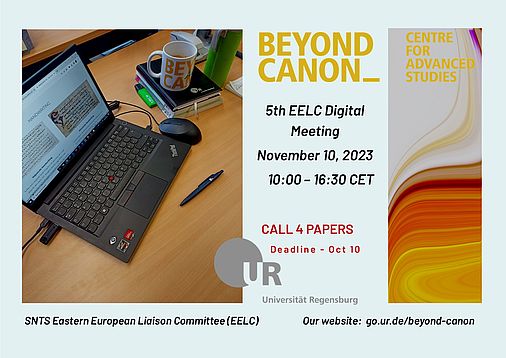
The Centre for Advanced Studies “Beyond Canon_” (University of Regensburg) will host the 5th EELC Digital Meeting for Emerging Scholars from Eastern Europe that will take place on November 10, 2023 (10:00 – 16:30 CET).
The Digital Meeting is intended for younger scholars (experience-wise) in New Testament, Early Jewish and Ancient Christian (and related) Studies from Eastern Europe with an outstanding Master’s Thesis, capable doctoral students and/or post-doctoral researchers, to present aspects of their research to a group of senior scholars and get a friendly, qualified, academic feedback. We also envision that these kinds of meetings contribute to forming collegial and respectful networks among the emerging scholars in the region.
Read more about the EELC activities here.
If you want to get involved in the EELC format, or if you are a doctoral or a post-doctoral researcher with a limited network of scholarly contacts, you can contact us. In case of any comments and suggestions, please write to Alesja.Lavrinovica@ur.de
12.09.2023
[ENGLISH]
„Afterlives of the Gregorian Sacramentary“:
International interdisciplinary Symposium on liturgical manuscripts of the Western Middle Ages in Regensburg attracts numerous renowned scholars
From September 6–8, the International Symposium “Afterlives of the Gregorian Sacramentary: Latin Mass Books and the Oganisation of Liturgical Knowledge (c. 850–1200)” took place in Regensburg. Organisers were Dr. Paweł Figurski (Polish Academy of Sciences & Alexander von Humboldt-Fellow) and Dr. Arthur Westwell (DFG position), together with Prof. Harald Buchinger, Chair of Liturgical Studies, where their projects are allocated, and Director of the Centre for Advanced Studies “Beyond Canon_” at Universität Regensburg.
Regensburg and Cambridge as centers of an interdisciplinary network
Numerous international scholars followed the invitation of the organisers, many of them associated with the Universität Regensburg and with the University of Cambridge: Dr. Paweł Figurski used to be a fellow in Cambridge, Dr. Arthur Westwell and other speakers hold a PhD from there; with Susan Rankin, Professor Emeritus of Medieval Music at the University of Cambridge, the doyenne of international musical medieval studies gave a presentation. The speakers represented a strong mix of established and younger researchers, members of renowned international universities and small but excellent institutions alike. All this was made possible by the co-funding from the Regensburger Universitätsstiftung Hans Vielberth and the Institutum Liturgicum Ratisbonense.
Culmination of long-standing agglomeration effects of the Chair of Liturgical Studies and “Beyond Canon_”
This international symposium was a culmination of a long-standing network of many years, which emerged in thematic continuation of an interdisciplinary conference held in 2016 (the conference volume was published this year, https://www.aschendorff-buchverlag.de/author/Irving%2C%20Andrew/). The synergies of Dr. Figurski, Humboldt, and Dr. Westwell, DFG, with long-standing research interests of the Chair of Liturgical Studies in the field of liturgical manuscript research, the CAS “Beyond Canon_” and other collaborative projects were clustered into strong agglomeration effects: numerous speakers, presenters, and audience members of the symposium have either visited Regensburg multiple times, are past or present DFG or Humboldt fellows, or have other associations with our institution.
Next conference scheduled for November 2023
This specialised international and interdisciplinary conference on liturgical manuscripts of the Western Middle Ages concluded with the prospect of yet another conference already scheduled for November this year: from November 23–24, a likewise international and interdisciplinary conference on Byzantine liturgical manuscripts will take place, then in synergy with a project of the Fritz Thyssen Foundation, which was recently settled in Regensburg under Dr. Marie-Ève Geiger.
[GERMAN]
„Afterlives of the Gregorian Sacramentary“:
Internationales interdisziplinäres Symposium zu liturgischen Handschriften des westlichen Mittelalters in Regensburg zieht zahlreiche renommierte Wissenschaftler:innen an
Vom 6. bis 8. September fand in Regensburg das internationale Symposium “Afterlives of the Gregorian Sacramentary: Latin Mass Books and the Oganisation of Liturgical Knowledge (c. 850–1200)” statt. Organisatoren waren Dr. Paweł Figurski (Polnische Akademie der Wissenschaften & Stipendiat der Alexander von Humboldt-Stiftung) und Dr. Arthur Westwell (DFG-Eigene Stelle) gemeinsam mit Prof. Dr. Harald Buchinger, an dessen Lehrstuhl für Liturgiewissenschaft beide Projekte angesiedelt sind. Prof. Buchinger ist zudem Direktor des Centre for Advanced Studies “Beyond Canon_” an der Universität Regensburg.
Regensburg und Cambridge als Knotenpunkte des interdisziplinären Netzwerkes
Zahlreiche internationale Wissenschaftler:innen folgten der Einladung der Organisatoren, viele davon mit langjährigen Verbindungen zur Universität Regensburg wie auch zur University of Cambridge: Dr. Paweł Figurski war Wissenschaftler in Cambridge, Dr. Arthur Westwell und weitere Referent:innen wurden dort promoviert; mit Susan Rankin, Prof. em. für mittelalterliche Musik an der University of Cambridge, hielt die Doyenne der internationalen musikalischen Mediävistik einen Vortrag. Die Referent:innen setzten sich aus einer Mischung aus etablierten Wissenschaftler:innen und aufstrebenden Jungwissenschaftler:innen, Mitgliedern namhafter internationaler Universitäten und kleiner, aber exzellenter Institutionen zusammen. Ermöglicht wurde all dies durch eine Kofinanzierung aus der Regensburger Universitätsstiftung Hans Vielberth und dem Institutum Liturgicum Ratisbonense.
Kulmination von langjährigen Agglomerationseffekten des Lehrstuhls für Liturgiewissenschaft und “Beyond Canon_”
Das Symposium war ein Kulminationspunkt in der Verdichtung eines internationalen Netzwerks in thematischer Weiterführung einer interdisziplinären Tagung im Jahr 2016 (der Tagungsband erschien in diesem Jahr, https://www.aschendorff-buchverlag.de/author/Irving%2C%20Andrew/):
Die Synergien von Dr. Figurski, Humboldt, und Dr. Westwell, DFG, mit langjährigen Forschungsschwerpunkten des Lehrstuhls im Bereich der liturgischen Handschriftenforschung, des Centres „Beyond Canon_“ sowie der verschiedenen Verbundprojekte wurden in starken Agglomerationseffekten gebündelt: Zahlreiche Referent:innen, Teilnehmer:innen und Mitglieder des Publikums waren entweder bereits mehrmals in Regensburg, sind ehemalige oder aktuelle DFG- oder Humboldt-Stipendiat:innen oder haben anderweitige Verbindungen zur UR.
Die nächste Konferenz findet bereits im November 2023 statt
Nach dieser spezialisierten internationalen und interdisziplinären Tagung zu liturgischen Handschriften des westlichen Mittelalters findet schon im November eine ebenfalls internationale und interdisziplinäre Konferenz zu byzantinischen liturgischen Handschriften statt, dann in Kooperation mit einem Projekt der Fritz-Thyssen-Stiftung, das kürzlich unter Leitung von Dr. Marie-Ève Geiger ebenfalls in Regensburg angesiedelt.
31.08.2023
Regensburg’s New Testament professor chairs conference of Eastern European scholars in Vienna
From July 24–25, under the chairmanship of Prof. Dr. Tobias Nicklas (UR), with co-chairs Prof. em. Dr. Karl-Wilhelm Niebuhr (Friedrich-Schiller-Universität Jena) and Prof. Dr. Christos Karakolis (National and Kapodistrian University, Athens), international scholars from Eastern Europe met at the pre-conference of the Eastern European Liaison Committee (EELC) at the 77th General Meeting of the Studiorum Novi Testamenti Societas/The Society for New Testament Studies (SNTS) in Vienna (July 25–28). Many scholars at different career stages with affiliations to the Centre for Advanced Studies “Beyond Canon_” successfully presented their papers, giving an insight into their current research projects.
Successful Initiative to bring back Eastern European Perspectives into Biblical Studies: Between “East and West”
12 scholars from 8 different Eastern European countries – Poland, Czech Republic, Serbia, Romania, Russia, North Macedonia, Ukraine, and Armenia – introduced the audience to their current topics of research, covering a wide range of subject matters of Old Testament, New Testament or early Jewish and ancient Christian writings as, for instance, the Armenian Infancy Gospel, Metaphors of Conversion in Pauline Writings, Jewish Prophets, Patriarchs, and Sybils in Post-Byzantine Romanian Iconography, aspects in the Church Slavonic Acts of Paul and Thecla connected to the Understanding of Mediaeval Kyivan Asceticism or the Cyrillic Early Printed Liturgical Tetraevangelia in the Eastern Church-Slavonic tradition.
Established in 1995, the EELC of the SNTS is bringing together New Testament scholars from Orthodox (east), Catholic, and Protestant (west) traditions, with a main focus on the support of Early Career Scholars. Prof. Dr. Tobias Nicklas, president of the EELC since September 2022, tells more about the history: “The EELC was founded about 30 years ago by Swiss professor and New Testament scholar Ulrich Luz from the university of Bern, who recognised the huge importance to bring Eastern European, especially Orthodox, perspectives back into biblical studies. This happened against the background of the dramatically changing political landscape in Europe at the end of the 1980s and early 1990s. For thirty years, biblical libraries have been supported and regular conferences have been organised to bring Western and Eastern perspectives on important biblical studies issues into conversation with each other.”
Promotion of Early Career Scholars by “Beyond Canon_” and SNTS 2025 in Regensburg: 30th anniversary of EELC.
Initiated by Prof. Tobias Nicklas from Regensburg, and given a strong impetus by the pandemic, the EELC’s work has received a new strategy by establishing Digital Meetings for Emerging Scholars, organised by “Beyond Canon_”, creating an important platform for scholars not having frequent access to international business travels but thus still given the opportunity for important scientific and scholarly exchange. Commenced in 2021, there have been digital and non-digital meetings in June and December 2021, 2022; May 2023 (a three-day in-person meeting between Early Career Scholars from Universität Regensburg, Charles University Prague, and Trinity Western University Vancouver).
Next meetings are in the planning: “For the coming years, it is extremely important to me to build networks for especially promising young scholars, and to support young women in particular. The next big conference will take place in North Macedonia, but until then many smaller activities are planned, such as a meeting for PhD students from the Western Balkans in Sarajevo and activities to support Ukrainian theologians,”
Prof. Nicklas states.
One of the major developments of the EELC has been the arrangement of East-West Symposia of New Testament Scholars; the ninth Symposium was held in September 2022 in Varna, Bulgaria. The next event will be planned as a cooperation between “Beyond Canon_” and the University of Skopje, North Macedonia, taking place in Ohrid/the Lake Ohrid region in 2026.
Before that, in 2025, the year the EELC will celebrate its 30-year anniversary, the Centre for Advanced Studies “Beyond Canon_” will organise the SNTS General Meeting at Universität Regensburg, expecting up to 400 guests from all over the world.
26.06.2023
Internationale Tagung zum Johannesevangelium in mittelalterlicher Rezeption" in Zürich mit "Beyond Canon_" (22.-25. Juni 2023)
Das Johannesevangelium in seiner vielfältigen Rezeption im europäischen Mittelalter war das Thema einer internationalen Tagung, die vom 22.–25.6. in Zürich veranstaltet wurde, gemeinsam organisiert von Prof. Dr. Jörg Frey (Theologisches Seminar) und Prof. Dr. Carmen Cardelle (Seminar für Griechische und Lateinische Philologie), beide Universität Zürich, und Dr. Stephanie Hallinger, wissenschaftliche Koordinatorin des Centre for Advanced Studies „Beyond Canon_“. Im Mittelpunkt stand die Erforschung der Rezeptions- und Wirkungsgeschichte dieses Evangeliums innerhalb unterschiedlicher Disziplinen. Fünfzehn Wissenschaftler:innen internationaler Hochschulen präsentierten ihre Forschungen dazu. Einen Höhepunkt stellte dabei der öffentliche Abendvortrag von Prof. Dr. Volker Leppin dar, der von der Yale Divinity School angereist war.
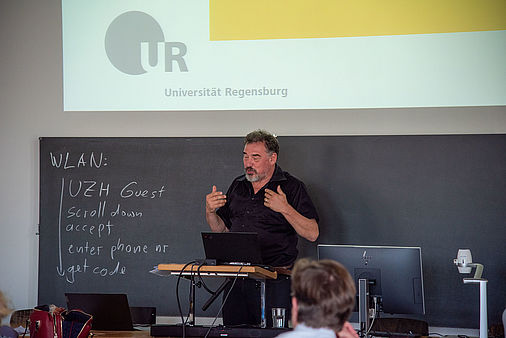
Rezeption von und Spiel mit biblischen Motiven und Themen
Prof. Frey skizzierte in der Einführung sein eigenes Forschungsinteresse. Im Rahmen des Projekts einer Kommentierung des Johannesevangeliums unter Berücksichtigung seiner immensen Wirkungsgeschichte sei die Bibelwissenschaft hier auf den Dialog mit Spezialisten anderer Fächer und Epochen angewiesen. Es gehe darum, in interdisziplinären Dialog zu treten und von den anderen Kolleg:innen zu lernen. Der Tagungsort, das Theologische Seminar der Universität Zürich im Kreuzgang des Grossmünsters, sei für einen solchen Dialog geradezu prädestiniert, denn hier begann in der Reformationszeit 1525 das gemeinsame Projekt der Zürcher Bibelübersetzung durch Theologen und Klassische Philologen aus dem Geist des Humanismus. Biblische Themen seien bis in die Gegenwart weit über die kirchliche Sphäre hinaus wirksam und auch im Mittelalter in ganz unterschiedlichen Textsorten und Medien aufgenommen worden. Aus diesem Grund sei die interdisziplinäre Zusammenarbeit verschiedener wissenschaftlicher Fächer so bedeutsam.
In der Bibelwissenschaft sei die Rezeptions- und Wirkungsgeschichte allerdings eher ein relativ junges Phänomen. Während in den Anfängen, nach dem Zweiten Vatikanischen Konzil, etwa im Projekt des „Evangelisch-katholischen Kommentars“ vor allem die Verständigung über die Konfessionsgrenzen hinweg im Zentrum stand, werde heute ein viel breiterer kulturgeschichtlicher Rahmen berücksichtigt, in dem die Bibel als Grundlage der abendländischen Kultur erforscht werde.
Johannesevangelium – das „geistige Evangelium“
Neben der Apokalypse sei das Johannesevangelium der Text mit der breitesten Rezeption, mit einer Wirkung weit über kirchliche und theologische Kontexte hinaus. Es verfüge neben dem theologischen Gehalt über eine narrative Eigenständigkeit, eine eindrückliche Metaphorik sowie eine eingängliche Sprache, und seit Clemens von Alexandrien wurde es aufgrund seiner Besonderheiten als das „geistige Evangelium“ bezeichnet. Die Wirkung der Johanneischen Figuren reichte daher ebenfalls weit über den theologischen Kontext hinaus in Literatur, Musik und bildender Kunst. Das Bild des sogenannten „Guten Hirten“ beispielsweise sei von großem Einfluss gewesen auf die Frömmigkeits- und Mentalitätsgeschichte, ebenso die Darstellung des „Lieblingsjüngers“ Johannes mit der Mutter Jesu in den bildhaften Darstellungen der Kreuzigung. Daher seien in der Erforschung der Wirkung des Johannesevangeliums stets in breiter Interdisziplinarität und Intermedialität die Literatur und die Bildende Kunst mit einzubeziehen, wie dies auch in der Planung dieser Tagung vorgesehen wurde.
Auch Prof. Dr. Carmen Cardelle betonte die dramaturgische Bedeutung des Johannesevangeliums, die sie als eine der Ursachen für die starke Wirkungsgeschichte dieses Evangeliums hervorhob. Dessen vielfältige Wirkung im Mittelalter wolle man mit dieser Tagung erkunden und weiter erforschen, und zwar über die Theologie hinaus durch die Einbeziehung von Literatur- und Liturgiewissenschaft, Kunstgeschichte, Architektur und Archäologie.
Apokryphen und Johannesevangelium vermischen sich
Der Beitrag von Prof. Dr. Ulrich Eigler (Lateinische Philologie, Universität Zürich) widmete sich dem Pilatuswort „quod scripsi scripsi“ („Was ich geschrieben habe, das habe ich geschrieben“). Dieses Wort aus der johanneischen Passionsdarstellung eröffnete einen weiten Fragenkreis im Blick auf spätere Passionsdarstellungen und Passionsspiele, die oft stark auf Johannes rekurrierten, daneben aber auch auf apokryphe Traditionen wie das beliebte Nikodemusevangelium. Es sei davon auszugehen, dass beim Publikum die Kenntnis solcher Schriften und Traditionen vorhanden war. Auch die anachronistische Darstellung von Handlungssträngen in den Spielen setzte einen gefestigten Wissensstand voraus, ebenso die absichtliche Unterscheidung zwischen inner- und außertextlicher Kommunikation, bei der Leerstellen – als Beispiel diente Jesu Titulus „INRI“ am Kreuz – bewusst als Kommunikationsräume verwendet worden seien, die durch das Publikum bzw. die Leserschaft selbst mit Sinn gefüllt werden sollten. Die Leserschaft/dem Publikum komme also in diesem Falle die Funktion zu, die vollständige Geschichte zu (re-)konstruieren.
Weitere Vorträge beschäftigten sich mit der Rezeption des Johannesevangeliums in der spätantiken lateinischen Bibelepik (Dr. Hedwig Schmalzgruber, Universität Graz), sowie im Evangelienbuch (Liber evangeliorum) des Otfried von Weissenburg (um 790–875), den Prof. Dr. Christina Hoegen-Rohls (Universität Münster) als denjenigen Autor bezeichnete, der den „Beginn der deutschen Philologie“ markiere und in dessen Evangelienbuch eine Kommentierung, Auslegung und Interpretation des Johannesevangeliums stattfinde.
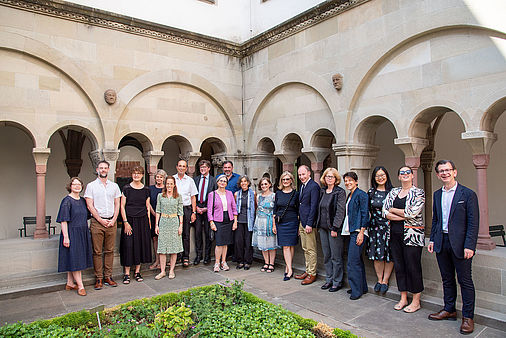
Das Johannesevangelium in der mittelalterlichen Frauenmystik, in der „Legenda aurea“ und im „Irischen Bibelwerk“
Bei seinem öffentlichen Abendvortrag befasste sich Prof. Dr. Volker Leppin (Yale Divinity School) mit „Geist und Körperlichkeit in der mittelalterlichen Frauenmystik“ anhand der Mystikerinnen Margarete Ebner, Mechthild von Magdeburg, Mechthild von Hackeborn und ihrer Schwester, der Äbtissin Getrud von Helfta. Letzterer erschien Johannes in priesterlichem Gewand als eine mystische Begegnung mit Gott; daraus folgerte sie: Wenn ein priesterlicher Bezug mystisch erfahrbar sei, werde die Person des Priesters überflüssig. Die Mystikerinnen nahmen in ihren Erscheinungen und Erlebnissen verschiedene Rollen ein, die die binären Geschlechtergrenzen überwanden, ebenso Johannes und Jesus selbst – aktuell könnte man dafür Termini wie genderqueere Fluidität verwenden: Gott ist weder Mann noch Frau, was den Mystikerinnen des Mittelalters durchaus bewusst war.
Nach einem Vortrag über die Auslegung eines Verses des Johannesevangeliums durch Meister Eckhart (Prof. Dr. Julie Casteigt, Universität Toulouse) schloss Prof. Dr. Barbara Fleith (Universität Genf) mit einer Präsentation zu „Spuren des Johannesevangeliums in der ‚Legenda aurea‘“ an, einem der zitatenreichsten Texte des Mittelalters, und griff am Beispiel der dort ausgeführten Johanneslegende auf die angesprochene Überwindung von Gendergrenzen zurück: Johannes sei als „virgo electus“ verstanden werden, denn er habe nach der Hochzeit zu Kana seine Braut verlassen, um Jesus zu folgen, sodass er seinerseits zur Braut Jesu geworden sei. Ihm sei es erlaubt gewesen, an der Brust des Herrn zu ruhen, um am heiligen Quell „trinken“ zu dürfen, also Jesus besondere Informationen zu entlocken.
Dem Johannes-Kommentar im sogenannten „Irischen Bibelwerk“ widmete sich Dr. Lukas Dorfbauer (Universität Salzburg). Dieses bislang fast unbekannte, umfangreiche Sammelwerk von Einzelkommentaren zur gesamten Bibel wurde wahrscheinlich im 8. Jahrhundert in einem irisch geprägten Umfeld entweder auf den britischen Inseln oder auf dem europäischen Kontinent verfasst und weist zahlreiche Parallelen zu zeitgenössischen populärsprachlichen irischen Texten auf. Die Rezeption des Johannesevangeliums erfolge hier vor allem über eine Epitome des Kommentars des Augustinus, sodass faktisch eine „Rezeption der Rezeption“ vorliege.
Johannes als Kirchenpatron, Prachteinbände und Passionsfeiern in der Liturgie und außerhalb
Prof. Dr. Carola Jäggi (Universität Zürich) befasste sich mit sakraler Architektur unter dem Patrozinium des Evangelisten Johannes. Ein Beispiel war San Giovanni Evangelista in Ravenna, eine Kirche aus dem 5. Jahrhundert, in Auftrag gegeben von Galla Placidia während ihrer Regentschaft über das Weströmische Reich. Die Kirche befand sich ursprünglich wohl näher am Hafen von Ravenna, was unter anderem auch das Patrozinium erklären könnte, da der Evangelist Johannes auch als Erretter der Ertrinkenden bzw. Retter in Seenot angesehen wurde: Galla Placidia geriet bei einer Schiffsüberfahrt selbst in Gefahr und überstand diese. Die zerstörten Mosaike zeigten wohl auch eine Darstellung der in Seenot geratenen Galla Placidia.
Mit Prof. Dr. David Ganz (Universität Zürich) wurde der Fokus auf die Buchmalerei gelegt, konkret auf den Johannesprolog in der mittelalterlichen Buchkunst. Ganz wies auf die hohe Bedeutung der Prachteinbände der in der Liturgie verwendeten Evangeliare hin und nannte als Beispiele den Codex Aureus von Echternach (11. Jh.), das Evangeliar Heinrichs des Löwen und Mathildes von England (12. Jh.) oder auch das Lindisfarne-Evangeliar (8. Jh.). In Illuminationen mittelalterlicher Manuskripte wurden die vier Evangelisten oft mit ähnlicher Physiognomie dargestellt. Dennoch kam dabei Johannes eine etwas herausgestellte Rolle zu, denn er wurde meist nicht mehr schreibend dargestellt, sondern mit dem bereits fertigen Buch; im irischen Book of Kells (um 800) könne die Johannes-Darstellung gar als Angleichung an die Darstellung Christi verstanden werden, indem mit Kreuznimbus und Mandorla ikonographische Mittel verwendet wurden, die im Allgemeinen für Christus „reserviert“ waren.
Die Beiträge von Prof. Dr. Regina Toepfer (Universität Würzburg) und Prof. Dr. Harald Buchinger (stellv. Direktor von „Beyond Canon_“ sowie Lehrstuhlinhaber Liturgiewissenschaft, Universität Regensburg) widmeten sich den zusammenhängenden Themen der mittelalterlichen Passionsspiele einerseits sowie der liturgischen Dramatisierung des „Planctus Mariae“ in der mittelalterlichen Passions- und Osterliturgie. Buchinger skizzierte anhand zahlreicher Beispiele aus der Liturgie die dramatische Ausweitung der Figuren der Mutter Jesu und des Lieblingsjüngers unter dem Kreuz sowie der Magdalena am Grab, womit sich in der Liturgie Intertextualität, Intermedialität und Performanz zeige. Die Passionsspiele des Mittelalters, außerhalb des kirchlichen Rahmens im Raum der städtischen Öffentlichkeit und oft durch einen ausgeprägten Antijudaismus gekennzeichnet, fungierten nach Toepfer gar als Massenmedien, durch die das biblische und außerbiblische Narrativ dramatisiert, aber auch emotionalisiert und popularisiert wurde. Dabei sei die Rolle des Apostels Johannes in den Spielen gegenüber der biblischen Tradition teilweise erweitert, während in anderen Spielen sogar zwischen dem Apostel und dem (erläuternden Text des) Evangelisten differenziert wurde.
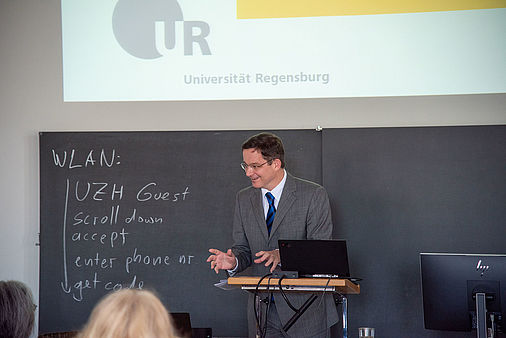
Was ist der Unterschied zwischen Rezeptions- und Wirkungsgeschichte?
Nach weiteren Präsentationen und Vorträgen knüpfte die Abschlussdiskussion wieder an Fragen an, die Prof. Frey bei der Begrüßung anriss: Wie lassen sich Rezeptions- und Wirkungsgeschichte definieren und unterscheiden? Ist eine Unterscheidung überhaupt möglich und sinnvoll? Die Überzeugung, dass es ein Text wert sei, überliefert, tradiert und benutzt zu werden, stelle bereits eine Rezeption dar, so Frey. Barbara Fleith verwies dabei auf apokryphe und hagiographische Schriften und Traditionen, die oft im Sinne einer Rezeption der Rezeption miteinzubeziehen wären. Prof. Dr. Greti Dinkova-Bruun (University of Toronto) schloss mit der These, dass nicht nur Texte und Texttraditionen, sondern auch performative Aspekte und materiale Kulturen untersucht werden müssten und berührte damit die essenziellen Forschungen von „Beyond Canon_“, die exakt diese Bereiche fokussieren.
Mit dieser Zürcher Tagung, die maßgeblich vom Schweizerischen Nationalfonds finanziert, aber auch von „Beyond Canon_“ mitgetragen wurde, dokumentierte sich einerseits die internationale Vernetzung von „Beyond Canon_“ und andererseits das weite Feld von Fragestellungen, das sich in der Rezeptionsgeschichte biblischer Texte über den Kanon hinaus in vielen Feldern und Medien eröffnet.
(c) all Photos: Kyungmin Kim / Universität Zürich
20.05.2023
"Why do we think New testament scholarship is important?" was the overall motto of an international (post-)doctoral Colloquium and Seminar in Haus Johannisthal from May 17th-20th, 2023
A group of international emerging scholars came together at Haus Johannisthal near Weiden, Germany, from May 17th–20th, 2023, to discuss their research and the overall future of New Testament studies. Dr. Judith König, assistant at the Chair of Prof. Dr. Tobias Nicklas, Professor of New Testament Exegesis and Hermeneutics and Director General of the DFG-Centre for Advanced Studies “Beyond Canon_”, Regensburg, and Dr. David Cielontko, Czech Academy of Sciences and Charles University, Prague, organized the event. Participants came from the University of Regensburg (UR), Charles University, Prague, and from Trinity Western University (TWU) near Vancouver, Canada, under the auspices of Prof. Dr. Thomas R. Hatina, Chair of the Department of Religious Studies at TWU and Visiting Professor at Charles University, Prague.
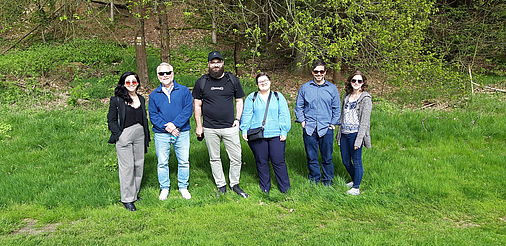 During the seminar, doctoral students and post-doc researchers presented their projects with a broad variety of topics to several young and emerging scholars as well as the professors:
During the seminar, doctoral students and post-doc researchers presented their projects with a broad variety of topics to several young and emerging scholars as well as the professors:
Stu Talene, from TWU and PhD student at Charles University, examines Marcion’s Evangelion and the composition of Luke-Acts and issued the statement, “Great authors don’t describe the world, they change it.”
Dr. Elisa Manzo, a postdoctoral fellow with the Margarita Salas Foundation in Spain, introduced the audience to the late-antique historian and theologian Orosius. In her project, Manzo combines historical, theological, and exegetical research and described her approach as walking with a torch, trying to make space between the words of Orosius’s texts and enlighten this space to discover exegetical meanings. While she pointed out, “context is always key, without forgetting the actual product.” Prof. Nicklas characterised Orosius as “an artist who painted with the medium of the bible.”
In the context of the presentation of his doctoral thesis, Marko Jovanović presented the models and theories of the parting(s) of the ways between Christianity and Judaism, the criticism of this approach which keeps being discussed controversially, and models of interlacement, concluding with a discussion about the use of models as such.
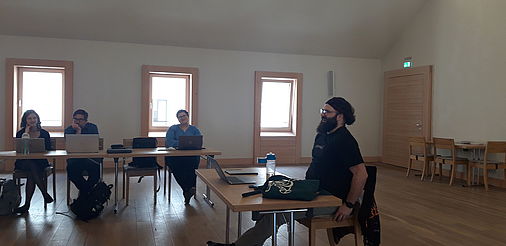 Dr. Mari Mamyan, post-doc at “Beyond Canon_” since 2019 and currently working on her own DFG-project on the Armenian Infancy Gospel, explained how comparing all possible witnesses of one text from different manuscripts and examining all variations, omissions, and additions – e.g., confusion of words graphically resembling each other or of similar sounding words – brings to light new results and aspects of the textual genesis and its variations in translations.
Dr. Mari Mamyan, post-doc at “Beyond Canon_” since 2019 and currently working on her own DFG-project on the Armenian Infancy Gospel, explained how comparing all possible witnesses of one text from different manuscripts and examining all variations, omissions, and additions – e.g., confusion of words graphically resembling each other or of similar sounding words – brings to light new results and aspects of the textual genesis and its variations in translations.
The semantic shift of the word ὥστε, from indicating result to purpose clauses and how it is used in LXX Leviticus and Greek documentary papyri, was presented by Naomi Rey, a promising emerging scholar from TWU, who is doing research on this topic within her Master’s thesis.
Dr. Judith König, former PhD student of Prof. Nicklas and now preparing her habilitation thesis research topic, proved the immense relevance of her project for society as a whole, dealing with the question of sexual autonomy in Antiquity and exploring the role of the bible, especially New Testament texts, in the context of sexual autonomy of women. The project was considered having the potential of changing the whole field of New Testament Studies: the bible was and still is used to do and justify great harm – thus, critical studies of the bible cannot be valued highly enough, and in the end, scholars do have responsibility.
With Kyle Parsons’ PhD thesis, the audience followed the tracking of negative reputations in early Christianity, e.g., with the example of receptions of the death of Judas, who can be read quite differently, as negative or tragic figure.
The all-encompassing parenthesis of the workshop was the question of relevance of New Testament scholarship today:
The competence regarding what “being human” means can be taught by the provided myths to live by as well as the revelation of us as human beings that were viewed as crucial. Critical studies of texts that can unfold danger go hand in hand with responsibilities, damage control, and the possibility of hoping to reverse harm. Understanding history through texts with a context that always needs to be taken into consideration can provide moral and ethical guidance, teach resilience against ideologies, and train social emancipation. Challenging changes with the competence to ask questions can be a way to facilitate peace.
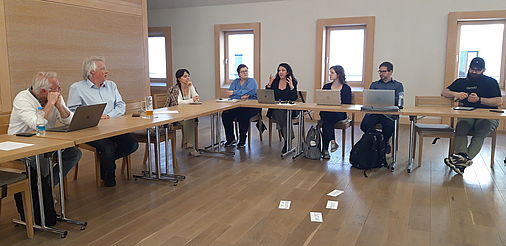 As always, also this exchange between international young researchers from different traditions and countries with the supervising professors provided an ideal opportunity for exchange beyond one's own disciplinary boundaries; the relationships established during this seminar will also be able to be used for more intensive research in the future.
As always, also this exchange between international young researchers from different traditions and countries with the supervising professors provided an ideal opportunity for exchange beyond one's own disciplinary boundaries; the relationships established during this seminar will also be able to be used for more intensive research in the future.
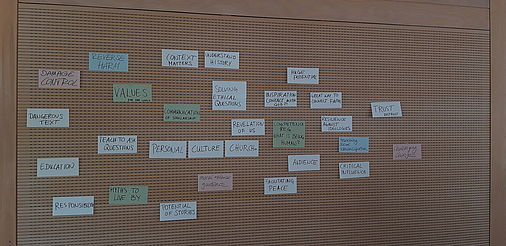
(c) all Photos: Charlotte von Schelling / "Beyond Canon_"
19.05.2023
GSCO Prize for the dissertation of Dr Gregory Tucker
Dr. Gregory Tucker has been awarded the GSCO Prize for his dissertation on "The Hymnography of the Midle Byzantine Ecclesiastic Rite & Its Festal Theology. Introduction - Edition & Translation - Commentary" (published in the series Studies in Eastern Christian Liturgies 5; Münster: Aschendorff, 2023) the prize of the Society for the Study of the Christian East 2023. After his doctorate in the Research Training Group "Metropolität in der Vormoderne" (DFG-GRK 2337), Dr. Gregory Tucker was a Junior Fellow of the Centre for Advanced Studies "Beyond Canon_" (DFG-FOR 2770) from 2021-2022 and has held a DFG position of his own at the Chair of Liturgical Studies since 2022 with a project on the Byzantine hymns for the Feast of the Transfiguration of Christ.
06.04.2023
Summer Programme
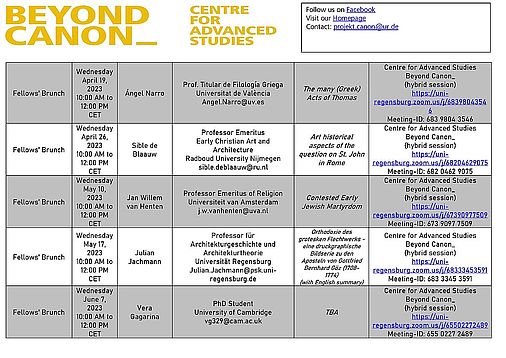
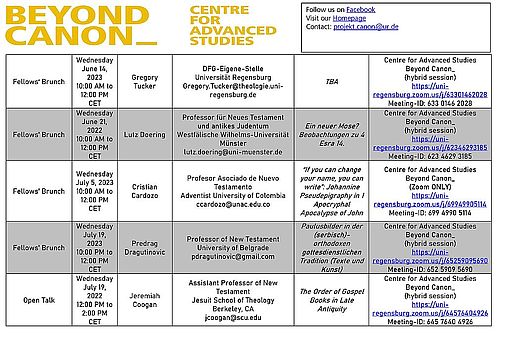
For more information and any updates, please contact
projekt.canon@ur.de
01.12.2022
Meeting HTLS — Project Canon
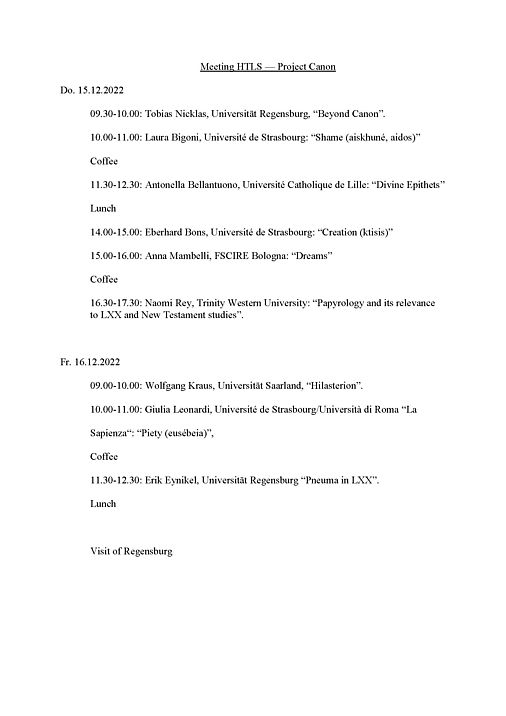
29.11.2022
TWO NEW DGF-POSITIONS
We are pleased to announce that two of the "Beyond Canon_" fellows have each been granted their own DFG position.
Dr. Mari Mamyan has been granted a position with her project on "The Acts of Thomas Rewritten: the Apostle Thomas in the Armenian Tradition".
From 2013 unil 2019, Dr. Mari Mamyan was a research assistant at the Institute of Ancient Manuscrips Mashtots' Matenadaran, Yerevan/Armenia. She was awarded a PhD from Yerevan State University in 2018. Since January 2019 she has been working at the "Beyond Canon_" Center in Regensburg on 'Synoptic Edition of the Armenian Infancy Gospel with Three Additional Versions (Armenian Tex and English Translation)' based on previously unpublished manuscrips.
Dr. Thomas Tops has been granted a project on "A Social-Historical Study of Truth-Telling in the Acts of Peter and the Acts of Thomas". After completing his doctoral thesis at KU Leuven and PThU Groningen, which was awarded the highest grade cum laude, Tops has been working at the Beyond Canon Center in Regensburg since October 2021 on a book about "Truth-Telling in the Gospel of John and the Early Acts of the Apostles". In his work, which is influenced by his philosophical, philological and theological training, Tops combines current issues with historical perspectives.
Link to the PDF version of the flyer
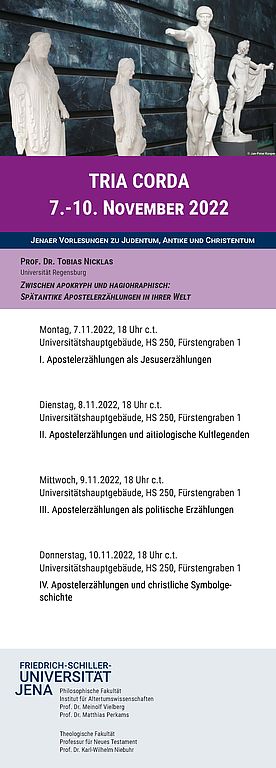
Link to the workshop flyer
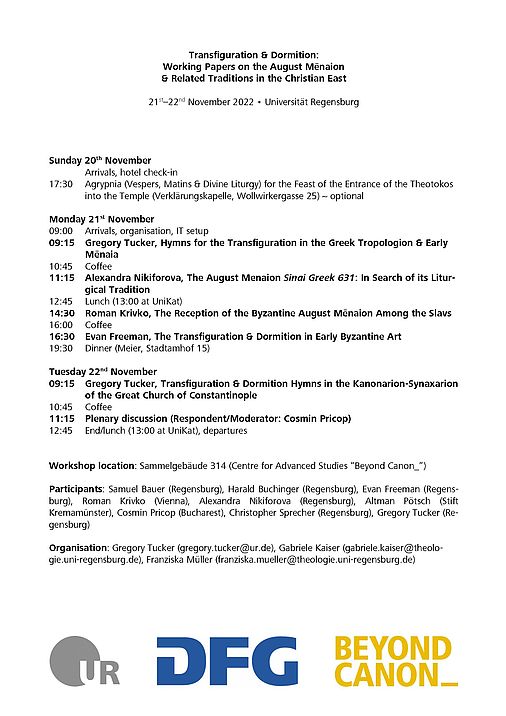
13. Oktober 2022
THE KAVANAGH LECTURE. INSTITUTE OF SACRED MUSIC, UNIVERSITY OF YALE.
We are pleased to announce that this year's Kavanagh Lecture of the Institute of Sacred Music at Yale University was given by Prof. Dr. Harald Buchinger.
The reading took place Thursday, October 13, 2022, under the title "Deposition Rites: Dramatic Liturgy and its Media between East and West".
A brief description of the lecture via the ISM Institute's website:
„This year’s Kavanagh Lecture will be given by Professor Harald Buchinger, Chair of Liturgical Studies at Regensburg University in Germany. Deposition rites, that is, ritual entombments of symbols of Christ’s dead body on Good Friday, have long been an emotional climax of Holy Week. As dramatic rituals and multi-medial representations of biblical history, they gave rise to innovative artistic, poetic and musical genres and exerted cultural influence far beyond liturgy. While deposition rites have been abandoned in the early modern reformation or recent reform in most Western churches, the Epitaphios procession is still one of the most popular services in Byzantine Christianity. The lecture will investigate the history and meaning of these prominent elements of Christian liturgy. Historically, it will be argued that the ritual may have spread from West to East and therefore against the widely assumed general trend of liturgical influence; hermeneutically, the character of mimetic rituals and their mediality will be discussed, not least in view of their theological and spiritual bearing.“
You can re-watch the entire lecture either via the Institute's own homepage or directly follow the attached YouTube link
For older news regarding the Beyond Canon_ Centre, please visit the German homepage



